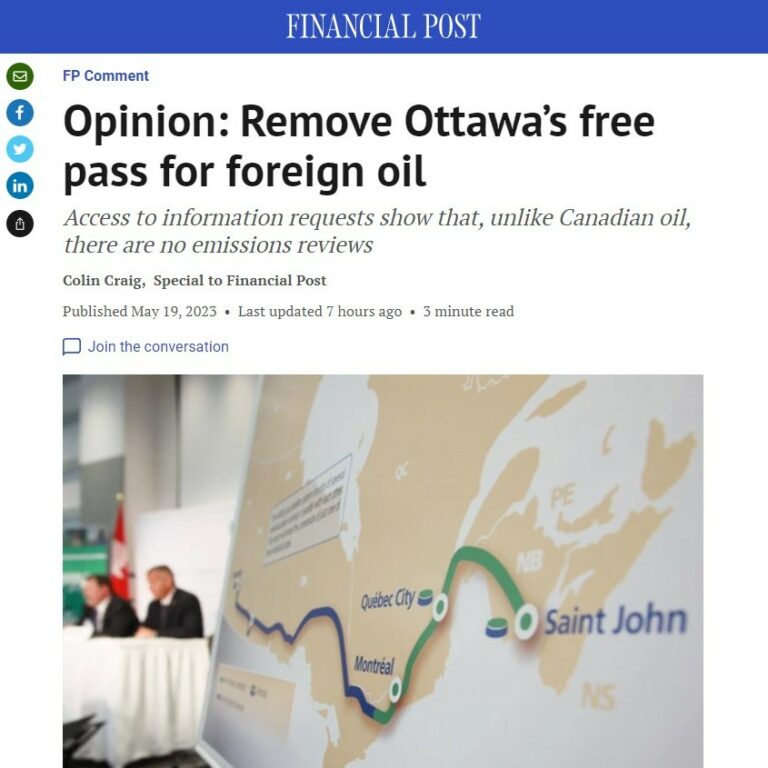FINANCIAL POST COLUMN: Remove Ottawa’s Free Pass for Foreign Oil

Should Canada’s federal government make it easier for Canadians to buy foreign than Canadian oil? It’s obvious how sensible Canadians would answer that question. But documents obtained by SecondStreet.org show that the federal government continues to give foreign oil a free pass while roadblocking Canadian projects. This not only costs Canadians jobs and business opportunities, it’s also worse for the environment.
Ten years ago, TransCanada (now known as “TC”) proposed a $16-billion “Energy East” pipeline that would have transported oil from Alberta and Saskatchewan to New Brunswick. For perspective, it would have cost the equivalent of building about 20 new NHL arenas. The industry’s supply chain involves manufacturers and services providers from coast to coast so the economic benefits would have been considerable right across Canada.
Once constructed, the pipeline would have allowed Eastern Canadians to purchase more Canadian and less foreign oil and it would have enabled Canada to export more oil beyond North America, instead of just to our primary purchaser, the United States.
The Quebec government opposed the project, but it’s doubtful the federal government even attempted to convince them it was in both the national interest and Quebec’s interest. Ottawa could have reminded Quebecers that projects like this help pay for social programs and that when the west does well economically, it pays significantly more to Ottawa than it receives back in funding — which means Quebec and other provinces receive more in equalization payments.
But this pipeline was not meant to be. Halfway through the National Energy Board’s expensive and exhaustive approval process, the federal government’s board changed the rules. In 2017, it famously announced that the pipeline would also have to go through an “upstream and downstream” emissions review. “Upstream” is the point in the supply chain that involves discovering, extracting and processing the resources while “downstream” presumably would have looked at emissions from end-users.
Proponents of the project could see the writing on the wall – who changes the rules of the game at halftime? The project was abandoned two months later. TC had to write down over $1 billion it had sunk into the project. Most of us would be disappointed if we lost a couple of hours working on a job application that didn’t result in an interview — never mind losing $1 billion.
At the time, while working for the Canadian Taxpayers Federation, I filed Access to Information requests with several federal departments to investigate what kind of “upstream and downstream” emissions reviews Ottawa was conducting for foreign oil imports. Every department responded that there were no such reviews. I asked about similar reviews of Ford and Bombardier before Ottawa handed them millions of dollars in subsidies and loans. The two firms literally create vehicles that burn oil and gas products, but Ottawa was not concerned about their emissions.
That was six years ago. More recently, SecondStreet.org filed new requests with Ottawa to see if anything had changed in terms of upstream and downstream emissions reviews for foreign oil and gas. The answer from Ottawa was still “no.” They have no such records. Foreign oil continues to receive a free pass.
A different and wiser approach for Ottawa would be to build more pipelines, not only because they’re more environmentally friendly than rail, but because selling our natural gas to coal-dependent countries helps them reduce their emissions; generating power with natural gas produces about half the emissions that using coal does.
Ottawa could even devote some of the billions in tax dollars these projects would raise to reducing emissions. Entrepreneurs have found ways to take captured CO2 and turn it into useful products, such as diamonds, vodka, plastics and carbon fibre. The federal government could assist these budding industries, not through subsidies, which are notoriously ineffective, but by paying companies based on the CO2 they reduce. No one would complain if the government hired a company to remove litter from a city park; the same approach could be used for the atmosphere. The government could tender contracts for CO2 removal, paying firms that were most effective at reducing emissions.
But that’s a big, bold plan. Let’s start by removing Ottawa’s free pass for foreign oil.
Colin Craig is president of SecondStreet.org, a public policy think-tank.
This column was published in The Financial Post on May 19, 2023.
You can help us continue to research and tell stories about this issue by making a donation or sharing this content with your friends. Be sure to sign up for our updates too!


